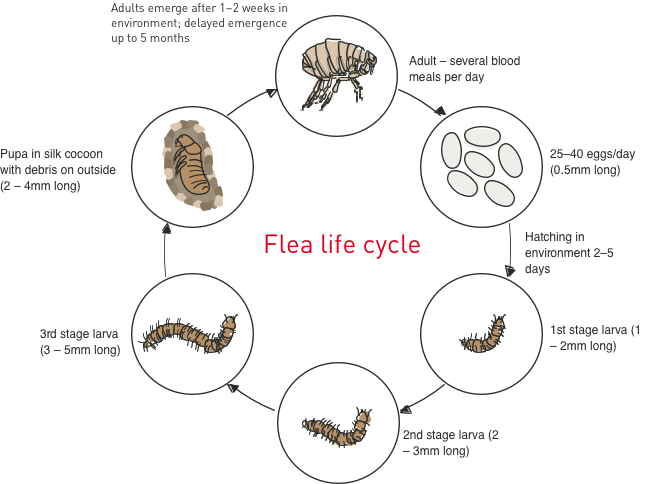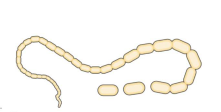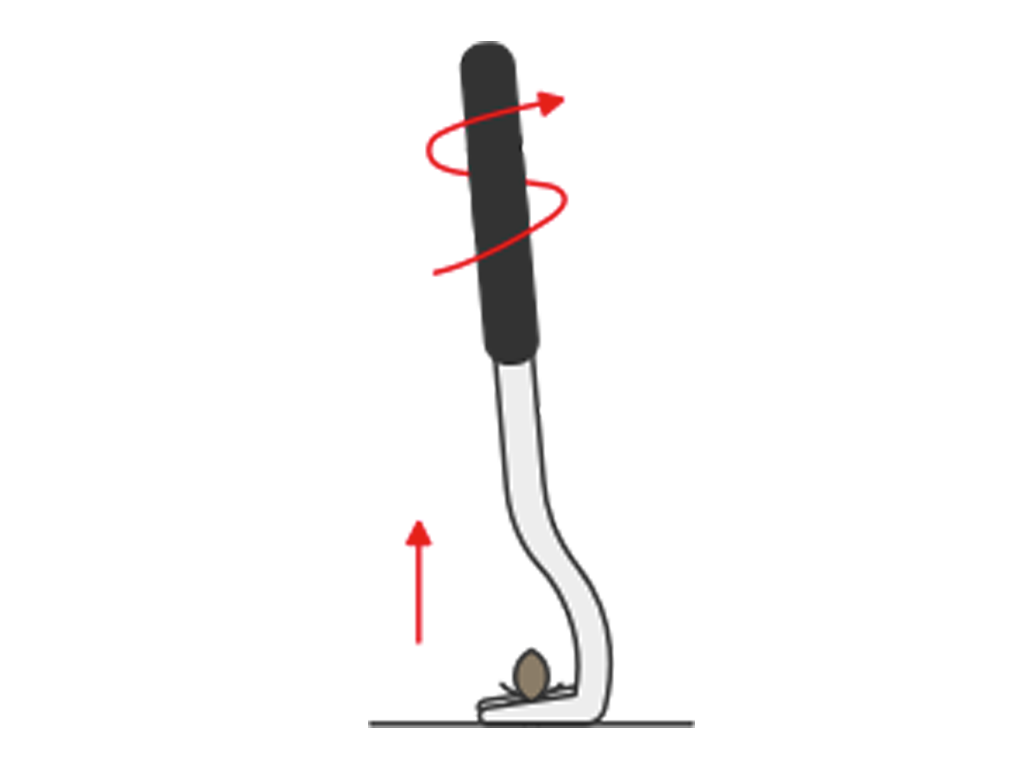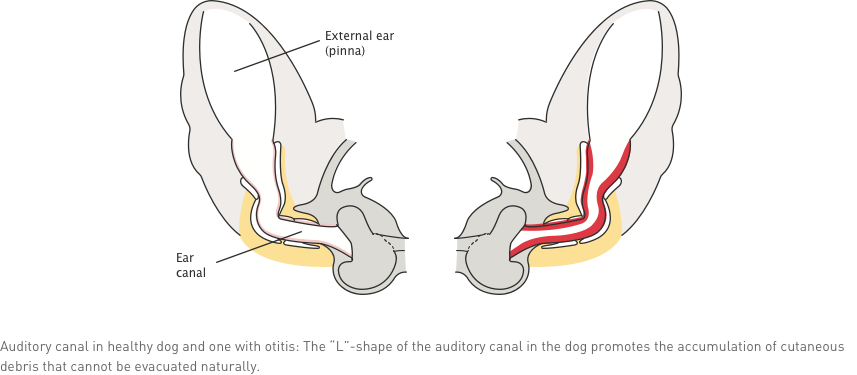Why does my dog keep scratching?
If your dog is scratching a lot, licking their coat excessively, rubbing against walls, or even shaking their head, it could be due to any number of things. Some reasons for the behaviour can range from dry skin to flea bites, hormonal imbalances, inadequate nutrition, anxiety or environmental factors. It’s far from a simple task to work out what the issue is. Here is a list of the most common reasons for your pet’s behaviour and the first steps to take before checking with your vet how to help dog with itching.

1: Parasite infections
If your pet excessively scratches, chews in between their fingers, licks their coat, frequently shakes their head, or scratches their ears, the first thing you should look for is if any parasite is involved. Parasites can be very good at hiding, and even if you can’t see them, they can cause your dog a lot of discomfort. Fortunately, they are various efficient treatments.
The following list can help you determine which parasite has infested your dog before you reach out to your vet for a diagnostic. It's important to consider that in many cases of parasite infection, your pet's bed and surroundings should be cleaned and treated with adapted products, to prevent another cycle of infection by the environment, once the larvae of the parasite become adult.
Fleas
Fleas are like tiny vampires, that bite your pet to suck their blood (and a garlic collar won’t stop them). Besides what fleas usually trigger: itch and discomfort that can even make some dogs very nervous, some dog also develop an allergy to the flea's saliva and become severely itchy, showing signs ranging from mild redness, small papules (small, palpable elevations of the skin) under the belly for instance to severe scratching that can often lead to skin infections. In extreme cases, it can also lead to anaemia and carry other disease agents (e.g. tapeworms).

Tapeworms
If your dog itches around their anal area, it's often a sign of an internal parasite. One of the most common of these is tapeworm. Tapeworm eggs can be ingested when your dog uses their teeth to remove fleas, as fleas often carry the eggs. The tapeworm feeds on the food ingested by your dog and deprives your pet of many key nutrients in the process.
This can cause your dog's skin and coat to become unhealthy and poor quality (dry coat, greasy hair, dandruff…) and creates itchy sensations. To minimise the risk, we recommend using a preventive treatment as prescribed by your vet.

Ticks
Adult ticks (small blood-sucking arachnids) are often found on the external part of your dog's ears, on their neck, or between the folds of their skin. As with fleas, a serious infection can lead to anaemia. Ticks are also known for more severe issues, such as spreading infectious diseases to other pets and humans. For instance in humans, ticks can lead to piroplasmosis or Lyme disease, which can trigger major consequences from fatigue and anaemia to liver or even renal failure. It's important to look for flea bites when returning home from walks and hikes. If you find ticks, remove them promptly and carefully using fine pointed tweezers or even better, with a tick removal tool (hook). Do not squash the parasite or leave the “head” (mouth) embedded in the skin. Make sure you disinfect the bite site and monitor the lesion afterwards. Ask your vet for help if you've never done it before. If you live in an area at risk for ticks, it's crucial to treat your dog with an appropriate preventive.

Ear mites
Common in puppies and young dogs, ear mites (a type of mite that look like tiny spiders) can find places in or around your pet's ears. Their microscopic size can cause intense and painful ear canal infections, forcing your dog to shake their head or scratch their ear consistently, sometimes creating bleeding wounds. If you suspect an ear mite infestation, look for a brown or black secretions from the ear. If you notice one, head to the vet as it's common for ear mite infestation to lead to a second set of infections due to bacteria or yeast.
Depending on where you live, a wider range of parasites can cause your dog to itch. In addition, ‘ear scabies’ can be infectious between pets so contaminations often happen after some time spent in a shelter or in dogs rescued after months in the street! Reach out to a vet in your area (you can use our vet finder) to find the precise cause and most appropriate treatment for your pet. Yes, vet knows best!
2: Canine Atopic Dermatitis
If your dog is excessively scratching, rubbing, grooming, or licking themselves, they may be suffering from Canine Atopic Dermatitis (CAD), a common hereditary skin disorder that causes pruritic inflammations (itchiness). Redness or lesions can be found around the face, joints, and perineal area where the skin reacts to environmental stressors such as pollens, mites, grass, moulds, or bacteria.
While the first signs of CAD will appear on young dogs from 6 weeks to three years of age, they will last their lifetime.
For genetic reasons, French Bulldogs, German Shepherds and Labrador Retrievers are more at risk than other breeds.

(Dog encyclopedia)
Even if CAD is one of the most common skin conditions in dogs, it's not the only one. So, if you notice redness, swelling, dandruff, or hair loss, contact your vet for a professional diagnosis and a specific treatment.
3: Food allergies and intolerances
Beef, chicken, lamb, fish, pork, rabbit, dairy, and wheat are among the foods that can cause allergies and be the reason your dog scratches. It's often a genetic condition and the reaction is triggered when your dog eats a certain amount of one or multiple ingredients, they’re allergic to (above their individual threshold of tolerance). The most effective way to find out if your pet has a food allergy is with the help of your vet, who will put them on an elimination diet for eight to twelve weeks. Food is not the only allergic pathogen that can cause your dog to have skin allergies.
4: Endocrine or autoimmune disorders
There is a risk that your dog might suffer from the failure of an endocrine organ to secrete the correct hormones needed to sustain healthy skin and coat. Different endocrine disorders are linked to different hormones (eg hypothyroiditis, Cushing syndrome…) and, while some can be cured with medication, others may require surgery. A visit to the vet is the best way to find out if a hormonal imbalance is the reason your dog can't stop scratching or shows some symmetrical hair loss on the flanks for instance.
5: Ear infections
If your dog is constantly scratching around their ears or shaking their head, this might be due to an otitis (ear infection or inflammation). Redness, swelling, discharge, and scaly skin are other symptoms of otitis and should be reported to the vet. If an unusual odour is present, it can be a sign of internal inflammation in the ear.
But ear scratching and pain or head shaking can also be linked to foreign bodies! For instance, during related season when spikelets dry out and stick into a dog’s ears (but also in the coat, nostrils, and even the paws). They can be very painful and need expert withdrawal from your vet.

How can you help prevent disorders and ease the discomfort of your dog’s itchy skin?
Whatever the reason your dog is itching, there are simple ways you can help ease the pain and side effects due to the intense scratching.
7 tips to help prevent and stop dog scratching in some common situations.
1. Keep their coat clean and soothe their skin by washing your dog with specialised shampoos when needed and by following a proper skin and coat routine.
2. Ask your vet about the preventive treatments for external parasites needed in your area.
3. Regularly clean and vacuum your pet’s bed and linen.
4. To ease the discomfort, you may be recommended to use treatments such as creams, sprays or as prescribed by your vet, or even pills and specific nutrition for a while.
5. Maintain your garden, keep the grass short and trim bushes.
6. Check your dog’s coat and skin when you come back from hikes and walks and after bathes.
7. Last but not least, it can be beneficial to feed your pet with an appropriate diet rich in nutrients known to support their skin’s health.
Don’t wait to ask your vet
Sometimes, problem skin is more than a skin problem. If your dog is excessively scratching, we recommend consulting your vet, especially if the behaviour has been going on for several days. The underlying reasons for itchy skin in dogs can be benign and temporary but they can also be long lasting and self-aggravating or even life-threatening. Only your vet can make a precise diagnosis and offer appropriate advice, treatment, and diet tailored to your pet’s health needs.
Like & share this page with your friends & family